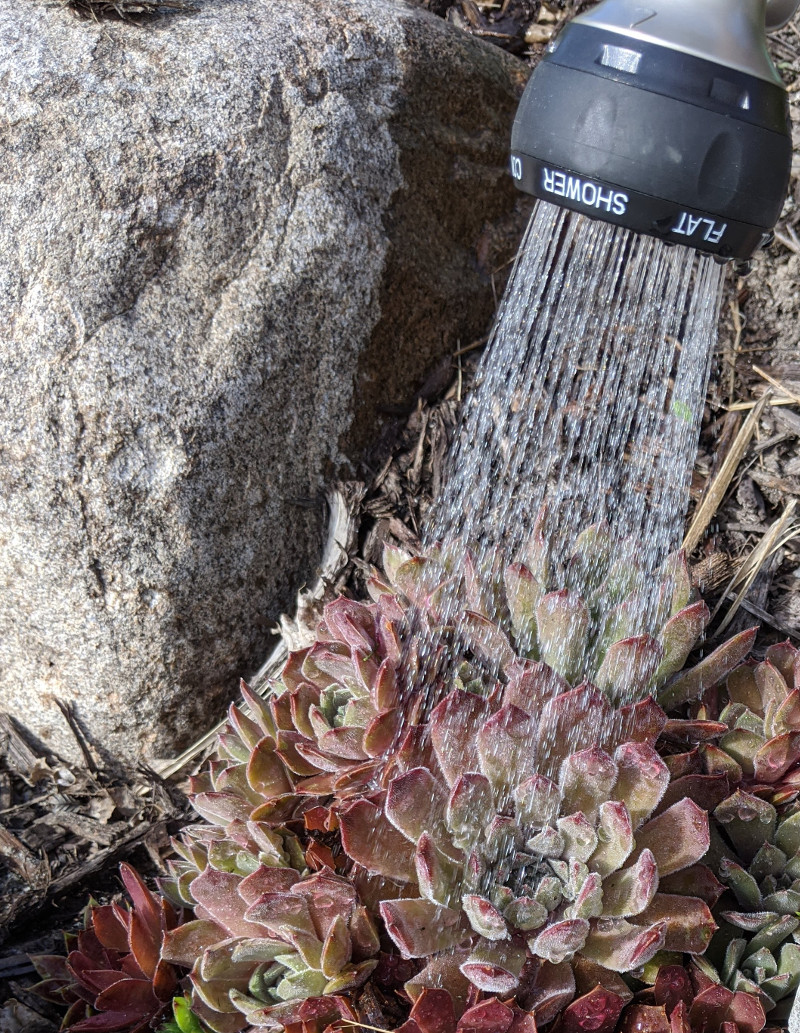Hens and chicks, or Sempervivum, is a hardy and unique succulent. By their nature, hens and chicks plants thrive with less water than most plants. The fleshy leaves that make up hens and chicks rosettes are designed to store water. So, this easy-care plant can grow with less water than most outdoor or indoor plants.

How To Tell If Hens & Chicks Need Water
One of the only ways people can kill succulents like hens and chicks is if they water too much. The top sign of overwatering is mushy or partially transparent leaves. Sempervivums can handle periods of drought, but only so much. Usually, when the plant needs water, you will notice the leaves look crispy, wrinkled, or bend more than usual.
How Often To Water Hens and Chicks
It is difficult to say how often to water sempervivum and how much water to give it without knowing other information, such as the type of soil in which it grows and its environment. On average, once a week is how often you should water hens and chicks.
Avoid watering hens and chicks when the soil is damp, especially after a rain. Hold off for a few days and check again. The plant won't wither in a few days. Outdoors, avoid placing irrigation drippers too close to hens and chicks. Adjust your system or emitter if your succulent is located near other plants that use more water.
Potted hens and chicks typically need watering more often than those in the ground. Terracotta containers in particular can dry out quickly.
Best Time To Water Hens and Chicks
In summer, it is better to water outdoor succulents like hens and chicks in the morning so the roots can soak up some of the moisture before peak heat sets in. Morning also is the best time when watering succulents in winter. The plants need some time to dry out before cool evenings set in. Overly wet and cool roots are subject to fungi and bacteria. Time of day matters less for indoor sempervivums unless the plant is receiving more heat and direct sun than it normally does or the inside of the home is cold in evenings.
How to Water Hens and Chicks
Step 1 – Fill a watering container that has a small or focused spout with collected rain water or the water you use on other plants.
Rainfall is the best and most natural water for hens and chicks.
Step 2 – Check to see if your sempervivum soil (outdoors or indoors) already is damp.
If it is damp, wait a few days. If the soil feels mostly dry and you haven't watered in a week or so, it probably is time to water.

Step 3 – Gently pour water from the container near the plant or into the edges of the plant's pot.
Avoid hitting the leaves and crown of the plant with water if possible.
Step 4 – It is best to water slowly and deeply so the plant receives about one-half inch of water a week, less if it has rained.
One way to water deeply is to pour slowly into a container and then return after the water has soaked in for a second slow drip.
Hens and Chicks Watering Tips
- Don't pour too much water onto the plant at once or for too many days in a row, even when dry.
- Tap water, well water or softened water might cause problems in hens and chicks.
- Water in the early morning when possible.
- Avoid over-watering hens and chicks.
 |
Author Teresa Odle - Published 5-17-2020 |
